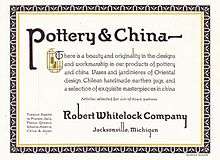Will Ransom
Will Ransom (1878 – 24 May 1955) was an American graphic designer, letterer, typeface designer, and the foremost bibliographer of private presses.

Youth and early career

Born in St. Louis, Michigan, Ransom grew up in Snohomish, Washington and began his career as a reporter, book-keeper, and printer’s devil for several papers in the Northwest. [1] Long interested in design, and having printed several art books on his own, Ransom was persuaded in 1903 to study at Frank Holmes’ School of Illustration. There he soon fell in with a group of young designers including Oswald Cooper, W.A. Dwiggins, and Frederic Goudy. Later that year, Ransom and Goudy founded the Village Press in Park Ridge, Illinois.[2] After an unprofitable year of operation, Ransom turned the Village Press over to Goudy’s sole proprietorship and, for the next nine years, took work as a book-keeper. In 1911 he married Helen Ruhman, a piano teacher, who gave him one child, a daughter, Frances Rose.[3]
Design career

Encouraged by his wife, Ransom again tried his hand at design, setting up shop as a free lance artist, designing advertisements for both Carson Pirie Scott and Marshall Field's department stores and the Rock Island Rail Road, as well as books for several publishers. At this point he designed his famous type face, Parsons, which he named for I.R. Parsons, an advertising manager for Carson’s department store. The face was an immediate success, not only popular with printers, and used in all of Carson’s advertisements for many years, but was among the most frequently used faces in motion picture titles and captions.[4]
He was credited by C.J. Bulliet, Editor of the art magazine for the Chicago Evening Post and later art critic of the Chicago Daily News, of being the person that, in 1923, introduced Helen West Heller to woodcutting, a medium in which she went forward to become one of the world's foremost practitioners.
Maker of books
In 1921 Ransom began publishing under the imprint of Will Ransom, Maker of Books. These volumes of fine printing were designed and decorated by Ransom, printed on paper made by Dard Hunter, and generally well regarded. The publishing venture proved unprofitable, however, and was abandoned in 1925.[5]
Later career
After again free-lancing, Ransom took the position of director of typography at the Faithorn Company. In 1927, Ransom began writing a series on private presses for Publisher’s Weekly, a task for which he was well suited, and leading to the publication of his noted book Private Presses and their Books (R.R. Bowker, N.Y.C., 1929). In 1930 he left Chicago for Rochester where he was employed by the Printing House of Leo Hart as a book designer for five years. In 1935 he moved to Buffalo where again he worked free-lance. By this time, Ransom had an impressive reputation as an historian of printing, so in 1939, Melbert Cary gave him a job in New York with the American Institute of Graphic Arts supervising the celebration of the 500th anniversary of printing. After this job terminated, he took work designing books for the Limited Editions Club and for Little and Ives. In 1941 Ransom became art editor for the University of Oklahoma Press. This last was his most satisfying position, as it allowed him not only to design books, but to continue his work on bibliography.[6]
Books
- Private Presses and their Books, R.R. Bowker, N.Y.C., 1929.
- The first days of the Village Press: extracts from the diary of Will Ransom, Press of the Woolly Whale, N.Y.C., 1937.
Typefaces
- Parsons series This font featured unique alternate characters that Ransom wished designers to use sparingly. However, as the font proved hugely popular, these letters were used indiscriminately and with bad taste. Ransom was so disgusted with this misuse of his font, that he all but refused to design any more faces.[7]
- Parsons (1917, Barnhart Brothers & Spindler (BB&S), later American Type Founders (ATF))
- Parsons Bold (1918, BB&S, later ATF)
- Parsons Italic (1918, BB&S, later ATF)
- Parsons Swash Initials were designed for BB&S by Sidney Gaunt, not Ransom
- Several series of Border Units (1920 - 1922, BB&S)
- Clearcut Shaded Capitals, sometimes called Ransom Shaded Initials (1924, BB&S, later ATF), capitals only, font does not include an X or Z.
References
- Will Ransom’s papers and correspondence are in the archives of the Newberry Library.
- ↑ Wells, James M., Will Ransom in Heritage of the Graphic Arts edited by Chandler B. Grannis, R.R. Bowker Company, New York & London, 1972, pp. 103-115.
- ↑ Bruckner, D.J.R., "Frederic Goudy," Documents of American Design series, Harry N. Abrams, Inc., Publishers, New York City, 1990, ISBN 0-8109-1035-7, p. 51.
- ↑ Wells, James M., Will Ransom
- ↑ Wells, James M., Will Ransom
- ↑ Wells, James M., Will Ransom
- ↑ Wells, James M., Will Ransom and Rollins, Carl Purlington American Type Designers and Their Work. in Print, V. 4, #1.
- ↑ MacGrew, Mac, "American Metal Typefaces of the Twentieth Century," Oak Knoll Books, New Castle Delaware, 1993, ISBN 0-938768-34-4., p. 247
External links
- Samples of Ransom's Parsons font by MyFonts.
- ATF's 1923 specimen book showing Parsons from p. 82
- Will Ransom Papers at Newberry Library
|